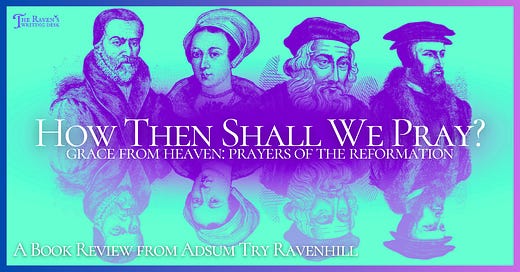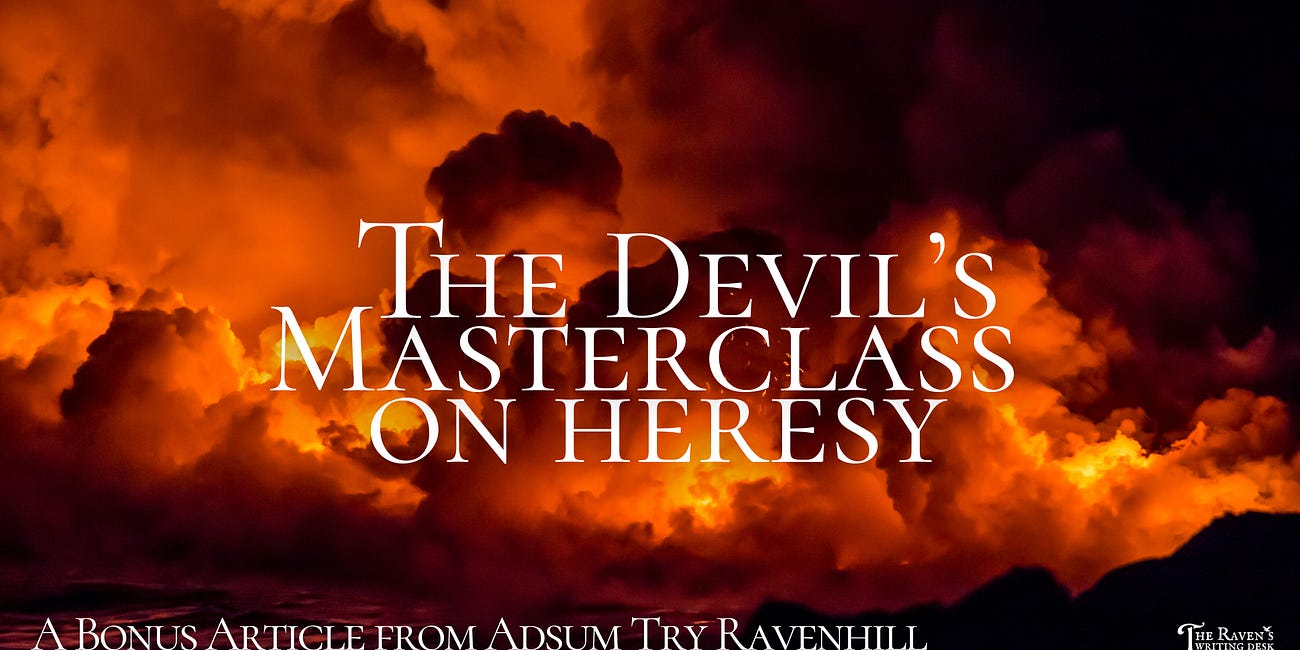How Then Shall We Pray?
A Review of Grace from Heaven: Prayers of the Reformation (Lexham Press)
A few years ago, I was sat next to a young man from church during a prayer meeting. Around a hundred people were in attendance, and yet very few were raising their voices to pray aloud. The boy nudged me and asked how he should pray, because he wanted to, but didn’t know how. I told him to simply thank God for something good.
He thanked God loudly, for his games console.
I was so proud of him for being brave enough to speak out, but I confess that I’d anticipated laughter. What followed were a number of short, sweet, and heartfelt cries of thanks, laments, and praises from saints both young and old.
Why?
His example was childlike and sincere.
Prayer is a language we learn, sustain, and develop in the same way as we do with any other language: we practice, we converse, and we learn from those around us. One of the ways that the Church has supplemented this pattern in centuries gone by, is through the use of prayer books. Before that the people of God used the Psalms for very much the same purpose, and written prayers have been dedicated to God for as long as writing has existed.
Over the past five years, since Mrs R and I got married, we have used prayer books a regular part of our nightly routine to bolster our own words, or to find the right words when we couldn’t find our own. A great example that released just today is called Grace From Heaven, a new collection of old prayers, written during the collective Reformations that took place throughout Europe over half a millennia ago.
These prayers are still just as relevant today as they were for John Calvin, Jane Grey, William Tyndale, John Knox, and many others. Here’s why.
Learning to Pray
“Hear me, merciful Father, for the sake of he who was a sacrifice for my sins, and to whom with you and the Holy Spirit be all honour and glory. Amen!”
Lady Jane Grey
“Can I pray for you too, Mr Adsum?”
I heartedly accepted the offer. Over the past three years, I’d seen him grow up so fast. When he turned ten, his family announced they were going to move away, and through tears he shared perhaps the great encouragement I’ve ever received.
“Mr Adsum, I’m really gonna miss all of the prayers you do for me.”
On his final day with us, he asked me to pray for him, and then prayed for me too. He praised God for his goodness, he prayed for my health, my marriage, and for our church, and thanked God afterwards. I’d never taught him a pattern of prayer per se, but he’d picked one up all the same.
It was delightful.
He was in tears again by the end. I gave him a big hug and thanked him for praying for me, and reminded him that I would still be praying for him in the years to come.
Prayer is absolutely something we do alone with God, but we learn primarily by praying with others, hearing their prayers for us, or by “Amen”ing those we hear at prayer meetings. Sometimes, however, when we’re alone we struggle to know how to pray, and we wish we could invite others to join in prayer with us. Grace from Heaven does just that. Perhaps you pray through a recent diagnosis with Ulrich Zwingli, or for greater patience with Thomas Becon. You might speak truth over lies with Martin Luther, or that the Lord would soften your heart like he did for William Tyndale.
These prayers, updated and modernised by Robert Elmer1, with other three hundred prayers included, from thirty-four authors across a spectrum of countries and traditions, you’re bound to find a prayer partner to guide you into your times of prayer each day, no matter what your circumstance. My experience of using prayer books like these over the years, has been that I have grown more and more as I have done so. I think I know why.
Throughout Covid my wife and I ran an online prayer meeting every Friday morning at 6:30am. People would roll out of bed before school, work, or another day of furlough, and dedicate the coming weekend to the Lord. We would pray for each other, for our Government, for our Elders, for riots and protests, and for the great commission. If you asked many of the attendees of that prayer meeting to recount to you one phrase that encapsulated our time together, they would likely say:
Personal Prayer feeds Corporate Prayer,
Corporate Prayer feeds Personal Prayer
I used to say this every time we’d meet, sometimes at the start, other times at the end, but over time people began mouthing the words together as I did. As Covid began to dissipate, and in person prayer meetings started up again I even heard some of them teaching others the same.
As we pray together with other Christians in throughout the Church, whether it be our local church, the church that spans the nations, or with saints who have gone before us, we grow in our ability to follow the commandment Jesus gave us in John 13:34-35:
“A new commandment I give to you, that you love one another: just as I have loved you, you also are to love one another. By this all people will know that you are my disciples, if you have love for one another.”
We’re better equipped to love those we agree with, and those we disagree with. With the easy ones and the hard sells, the young and the old, the Baptist and the Presbyterian, the Catholic and the Orthodox, simply put, with each other.
When we’re all looking in the same direction, pouring out our praises and our struggles, taking in the cross and the throne, and when we all lay down our sinful confessions together, we have a far harder time wrestling afterwards. Why not take some time today to pray for someone you usually wouldn't, or with them if you can?
If you’re interested in picking up the book for yourself2, you can find it on Lexham Press’ own website, or over on Amazon by clicking on this link:
Grace and Peace,
Recommendations of the Week
expertly illustrates the intersection between oral tradition, the written historical record, and archaeological evidence in his latest piece about the burial place of our Lord. Astoundingly, unlike most articles he does actually answer the question he begins with, leaving room only for a shadow of a doubt.
is an important voice in a culture which has replaced love with tolerance, and is causing untold damage as a result. Sophie’s story is one that might have ended much differently had she been born just a few years later, but God had other plans.
This latest article from condenses lessons learned and relearned throughout a recent spell of writer’s block. Whether you’re a writer, a creative, or just someone that knows what it is to run out of fuel, this is for you.
Herein lies my only struggle, if a very minor one, in that I wish he had left the nuances of British English as they were (honour/honor etc)
I was sent this book by Lexham Press to review, but was not required to write a positive review and I will not get kickbacks from any future purchases.










Always looking for new perspectives into the discipline (and joy) of prayer. Will have to check this out! Thanks, Adsum!
This sounds like such a great book! You've tempted me to read now too.